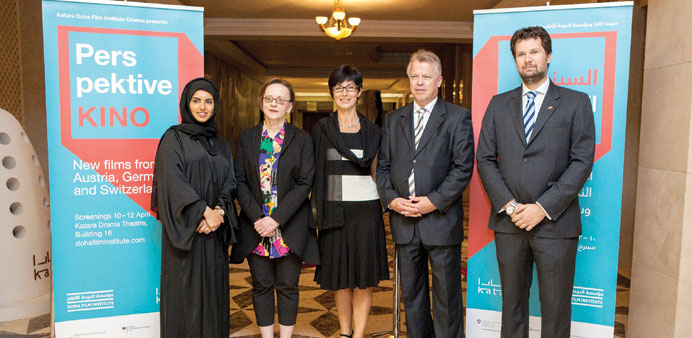AMONG THE AUDIENCE: From left: Fatma al-Remaihi, Director of Ajyal Youth Film Festival & Programmes, Doha Film Institute; Angelika Storz-Chakarji, Ambassador of Germany; Sieglinde Fedele di Catrano, Chargé d’Affaires, Embassy of Austria; Urs Schnider, Chargé d’Affaires, Embassy of Switzerland and Dr Dennis Kumetat, First Secretary, Cultural, Political and Press Affairs, German Embassy.
By Anand Holla
From the first scene of Barbara, where the protagonist puffing away in the park is watched from an upper-storey window by a young doctor and a wry old man who works for the stasi (the East German secret police), to the satisfying concluding scene, the consistently unsettling atmosphere keeps you both restless and gripped.
At the Katara Drama Theatre, Barbara – which won its director Christian Petzold the Silver Bear at the Berlin International Film Festival in 2012 – seemed to be a stellar choice to open the Doha Film Institute’s celebration of German language cinema with the Perspektive Kino film festival.
Held in partnership with the Austrian, German and Swiss embassies in Doha, the four-film series that was on from Thursday to Saturday, gave Qatar a taste of recent German-language cinema.
While the opening night on Thursday saw a special event attended by dignitaries from Germany, Austria, Switzerland, and of course Qatar, Friday witnessed the bulk of cinephiles catch the acclaimed Barbara (2012), and The Wall (2011).
Strangely, the common motif of the films’ plots was an impenetrable wall (in Barbara’s case, the Berlin Wall).
In 1980, East Germany, where trust was in short supply, a Berlin doctor Barbara (Nina Hoss in a riveting performance) is shunted to a rural medical clinic as punishment for applying an exit visa.
For the ever-watchful Barbara, doing rounds of the hospital are as routine as enduring constant harassment from the stasi. Even the good-hearted clinic head Andre finds it tough to break through her aloofness.
In the midst of Barbara’s clandestine meetings with her lover and finding secret ways to source money for what appears to be an escape plan, things change such that she is forced to take a closer look at what really matters to her.
Petzold’s unhurried yet unrelenting treatment of paranoia and danger makes this drama play out as an unconventional psychological thriller. If you missed it on the big screen, you should definitely watch this on DVD.
In comparison, Julian Pölsler’s Austrian-German film The Wall doesn’t affect you as much. The fantasy-drama starts off brilliantly, thanks to a high-concept premise. On a hunting trip in the Alps, a woman finds herself cut off from all human contact when an invisible wall, out of nowhere, surrounds the countryside.
With loyal dog Lynx by her side, she must resign to her fate, stay mentally, emotionally, and physically strong, and soldier on. Though she has many animals for company, it is for human contact that she craves. Save for a dramatic scene towards the climax, the rest of the film focuses on her musings of life and existence as she learns to make peace with nature.
What comes off as strange though is that the film doesn’t for once let her act out her frustration, which would be to attempt penetrating the wall.
Also, we never know how, why or when the transparent wall came into being. It’s because of this reason that the fantasy element – of the wall – seems a little forced in a narrative that is devoted to take the viewer through an individual’s detached-from-civilisation journey.
Based on a novel by Austrian writer Marlen Haushofer, The Wall’s biggest triumph is in its stunning cinematography of the mountains. Not to forget the powerful performance of Martina Gedeck, who earlier shone in The Lives of Others (it won the Oscar for Best Foreign Language Film in 2006).
As for the symbolism of the wall in both the films, the protagonists eventually learn to live with feelings of captivity and seclusion that a wall inadvertently brings along. As Albert Einstein rightly said, once we accept our limits, we go beyond them.

